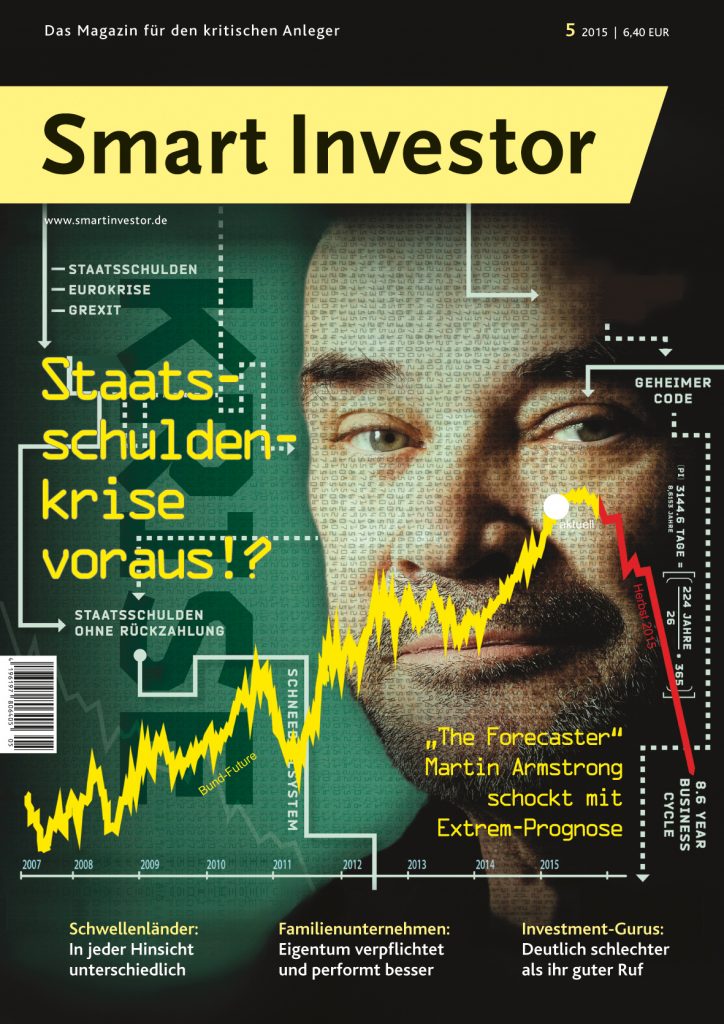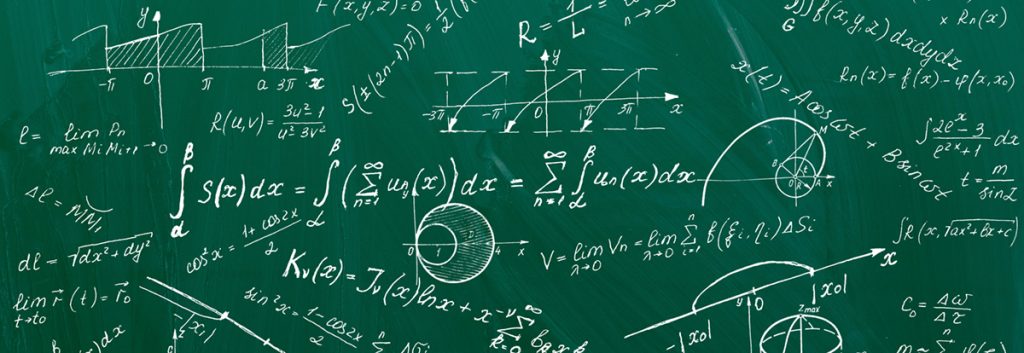I recently appeared on the cover of “Smart Investor” after being approached by journalist Ralph Malisch. Click here to read the full interview (German).
The English translation is available below:
Smart Investor talks to legendary cycle analyst Martin Armstrong about Corona, war and reshaping the world
Smart Investor: Mr. Armstrong, in 2015, The Forecaster, a powerful film about your life, was released. We interviewed you extensively in Smart Investor 5/2015. How have you been doing in the meantime and what are your current projects?
Armstrong: I was involved in a sequel to the film that will be out later this year. Otherwise, we have expanded our services and have now launched our computer system, which is the system that the government wanted for itself. It now produces over 1,000 written reports every day all over the world without human intervention. We now use it in over 40 countries, which means we probably have the largest institutional customer base in the world.

Smart Investor: Would you briefly explain your forecasting approach to our readers again?
Armstrong: In the 1980s and 1990s, I was one of the top international hedge fund managers, even being named hedge fund manager of the year for predicting the collapse of Russia, which triggered the 1998 hedge fund Long-Term Capital Management crisis. During that time, I’d watched global investment capital refocus on markets and then move on—leaving Japan in 1989, Southeast Asia in 1994, and Russia in 1998, followed by the euro. All of this was fueled by capital flows. One can follow these movements of capital and see how they cause the boom-bust cycles around the globe.
Smart Investor: The topic of Corona has kept us under its spell for more than two years. Was this turning point, or a drastic event like this, visible in your cycle model?
Armstrong: Yes, I warned at our own World Economic Conference that if our model flipped in January 2020 (= year 2020.05) the market would crash. We were even able to pinpoint the exact day for the March 2020 bottom. Had an event like Corona happened during an uptrend, it would have been largely ignored. But if something like this happens while the model is turning down, then sentiment is inherently bearish. We also warned that there would be a scarcity-based commodity cycle from January 2020 to 2024.
Smart Investor: In our perception, major pandemics occur with a certain regularity. Have you thought about some kind of plague cycle and how it might continue?
Armstrong: Such epidemics have always existed – but never in history have governments reacted so madly. The global lockdown has cost jobs and created bottlenecks in supply chains that will persist for several years to come. It was an absurd response that was proven wrong and caused a lot more damage. Most people know someone who got sick from COVID but didn’t die from it. Those who died would likely have died from any form of respiratory disease, such as occurs during the annual cycle of influenza. It was not a dangerous plague that killed 30% to 50% of the population like smallpox or the black plague in the 14th century.
Smart Investor: Now a new dominant event has been triggered with the hot war in Ukraine. How does this war fit into your model, specifically the war cycle?
Armstrong: That too came at exactly the “right” time. Our model showed 1/16/2022. Unfortunately, instead of trying to bring peace to the world, the West has demonized Putin. The claim that Putin wanted to restore the old Soviet Union was pure propaganda. For the past 22 years he has made no attempt to restore communism, only calling Lenin himself a communist. He did not try to expand the borders but warned against NATO encroachment. In war, both sides spread propaganda, and it is always important to be objective about the claims of both sides. Putin’s invasion of Ukraine was consistent with his warnings and came four days after US Vice President Harris recommended Ukraine join NATO. That was totally irresponsible.
Smart Investor: Can you see in your models which regions or countries will suffer the most in this conflict, who will get off lightly and who will be the beneficiaries?
Armstrong: On both sides there are what we call neocons, people who just hate the other side. They cannot sleep at night as long as their enemy exists. Unfortunately, the deteriorating economic outlook is a reminder that war has often served as a diversionary tactic in the past. It looks like China is allying itself with Russia. I believe the confiscation of Russian private property was a serious violation of international law. Others, too, will realize that their assets could be confiscated if their country got into a dispute with the West. This would, of course, lead to a drop in global investment. It is precisely this process that seems to have started and, according to our models, will only get much worse over the next ten years. Disputes between countries are likely to remain at this level. The arrest of individuals simply because they are Russian is reminiscent of the internment camps for Japanese in the US during World War II solely on the basis of their ethnicity. It is very detrimental to the world economy when free investment is hampered.

Smart Investor: If we understand it correctly, the cycles develop largely independently of the specific actions of individuals. It’s hard to imagine, but would an escalation have been inevitable even if the Russian President hadn’t given the order for the invasion?
Armstrong: That’s right. Demonizing Putin is absurd. There have been far worse leaders in history, like Hitler or Stalin, who could kill millions of people without thinking twice. The development of things is primarily determined by the economy. Normally you don’t bite the hand that feeds you. But imposing sanctions on Russia has exactly the opposite effect: they isolate Russia and sever economic ties, leading to casualties and in turn evoking anger and retaliation. Rome survived for 1,000 years because the conquered provinces benefited from selling their products to Rome. The confiscation of Russia’s currency reserves is above all a warning to China to be very careful in its dealings with the West. For China, the exclusion of Russia from the SWIFT system only means that it is working flat out to introduce its variant of CIPS. Saudi Arabia just agreed to sell oil for yuan. These measures only guarantee that conflicts will continue to escalate and the world economy will be split in half.
Smart Investor: As investors, we try to prepare for strong cycles like these. Which asset classes or sectors should one avoid in this situation and where can one expect safety?
Armstrong: Government bonds in particular are to be avoided. Governments will default and you will get nothing back. The loans from European governments from before the Second World War are now just an attractive wall decoration. When a company goes bust, its assets are sold and at least you get something back. But you can’t just run into the art museum and steal Picassos in the government. In times of war and geopolitical conflict, real assets are the best security.
Smart Investor: Gold is considered the safe haven, and Bitcoin is also perceived as such in some places. However, these two assets are also more of a thorn in the side of our governments. What do you think of the idea that the Russia argument could make life difficult for investors here in the future?
Armstrong: Gold has lost its mobility – so you can’t hop on a plane and fly somewhere with a briefcase full of gold coins or bars. Cryptocurrencies are vulnerable, because without a power grid, credit cards are a thing of the past. The government is trying to switch to digital currencies and they will not allow competition so they will confiscate cryptocurrencies. The best is paper money or small denomination silver coins that are recognizable to the average person. Tin cans will also have an exchange value if there is no electricity grid.
Smart Investor: Gold and cryptocurrencies are also the main alternatives to paper money, which the war is putting additional pressure on. Will the US dollar and euro survive this?
Armstrong: The US dollar will outlast the euro, but if we get into a real world war, the paper dollars could lose their value too. Europe has historically canceled its fiat money, while the
US dollar has never been cancelled. Even Canada is now nullifying its currency.
Smart Investor: The Great Reset, the World Economic Forum and Prof. Dr. Klaus Schwab are making waves in Europe. During the corona pandemic, the government measures literally dismantled the medium-sized economy. What do you think of the corporations’ “Big Plan” and are the actors’ ideas compatible with the cycles?
Armstrong: The Great Reset is indeed a real goal. It’s not a conspiracy theory. The three stumbling blocks along the way were Trump, Putin and Xi. They got rid of the first one, and now the propaganda has turned to demonizing Putin and Xi. They believe that if they get rid of these two leaders, they can unite the world under the United Nations. Our models have warned that authoritarianism will rise in this final decade. But they will fail. Marx succeeded only because serfdom in Russia did not end until 1861, while in Europe it only lasted until the fourteenth century. So the people owned nothing, and it was easy to confiscate the wealth of the aristocrats. Today people own their own houses, cars and save for the future. The slogan “You will have nothing and be happy” propagated by the WEF is a red herring. Governments can no longer borrow indefinitely and there will be a default. To disguise this fact, the impression is given that all debts are being forgiven and that they are doing it for you. The guaranteed basic income will be there to replace the pension funds that hold government debt today.
Smart Investor: Thank you very much for your very interesting explanations.
In stock market circles, the American Martin Armstrong (born 1949) is considered a legend. As early as the early 1980s, he correctly predicted the stock market crash of 1987 – and in the midst of the panic he predicted new highs for 1989. He also predicted the bursting of the Japanese stock bubble at the end of 1989. He made his forecasts using the “Economic Confidence Model” (ECM) he developed himself, which is based on a database on the history of coins, which Armstrong used to reconstruct the (financial) history. You can find his daily updated assessments on the blog https://armstrongeconomics.com .










